This interview was written in January 2021. We do not guarantee the timeliness of the information.
Jiří Denk is an experienced sailor and explorer of unknown places who has sailed around the world several times. The first time was with the sailing ship Altego I, when he became the twelfth Czech in history to do so. Jirka usually spends 5 months of the year on the boat and his wife Petra and little daughter Hanička usually sail with him. We asked him what this family life on board looks like and where he is going now.
When he doesn’t sail, he coaches, inspires and motivates companies, and he does a number of activities closely related to personal development. Some of these are actually held on board a yacht because sailing is a true test for all. Just after our interview, Jiri Denk set sail on a route along the Caribbean, which ended in March 2019. He sailed 3.510 Nm.
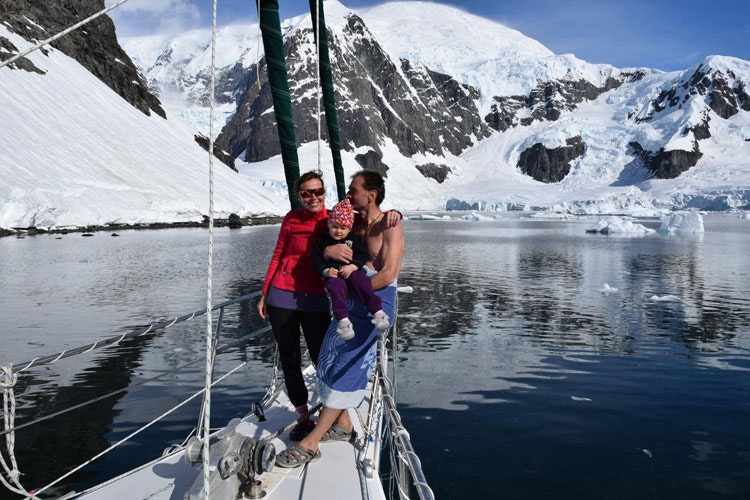 Jiří Denk, his wife Petra and his daughter Hanička
Jiří Denk, his wife Petra and his daughter Hanička
So the tenth stage is next? Where are you headed?
The most romantic part of the world is waiting for me. I begin on November 11, 2018 in an unusual place - in Suriname. Then we head for Guyana, French Guiana, then Trinidad and Tobago. The Grenadines and St. Lucia await us. Then we will move on to Martinique and Guadalupe.
There we will be joined by some family which we are very much looking forward to. Besides me, my wife Petra and our daughter Hanička, there will be two of Hanička’s cousins. They'll be sailing with us for the first time, so it's going to be a big occasion. And we’ll spend Christmas there.
Where are you headed after Christmas?
St. Martin, Anguilla, the British Virgin Islands and Puerto Rico. In the next part of the journey we’ll head to the Dominican Republic, Jamaica, Cuba and to the Bahamas. I’ll sail alone from the Bahamas and end up somewhere in New York in mid-April. And then it all depends on the weather. If it's warm, it'll be over to New York or, if it's cold, somewhere further south. Depending on where my coldness takes me.
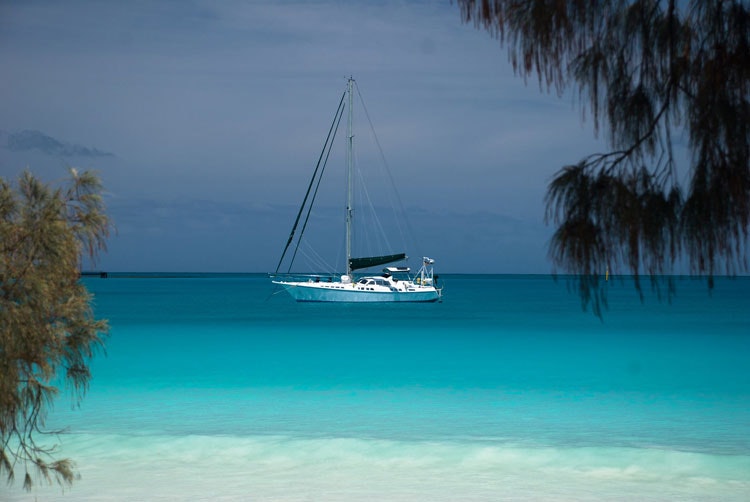 Sailboat on the voyage around the world
Sailboat on the voyage around the world How do you combine a voyage with your family? Do your wife and daughter sail most of the way with you?
My wife and daughter generally join me for more than half the voyage. Right now we think it’s best for Hanička to go to kindergarten, so they’ll arrive in 20 days time. Then we'll travel to Jamaica together. After that the girls go home for about three weeks and then come back again. A bigger crew will join us and there wouldn’t be room enough for the girls. Plus Petra is glad to be home at least for a while. And then the whole family will go around Cuba to the Bahamas.
What is it like for your daughter?
Totally amazing. She is 4.5 years old and has over 12,000 NM under her belt already. A typical yachtsman, who goes once a year to Croatia, can’t even begin to imagine such a distance. So it's a great start to life!
What does your daughter like most on the boat and what’s the most fun for her?
For two years we'd only been in cold waters - last year we sailed to Patagonia, the Falklands and South Georgia. So now I assume in the warmer waters that she’ll just love swimming, jumping in the sea, diving and snorkeling.
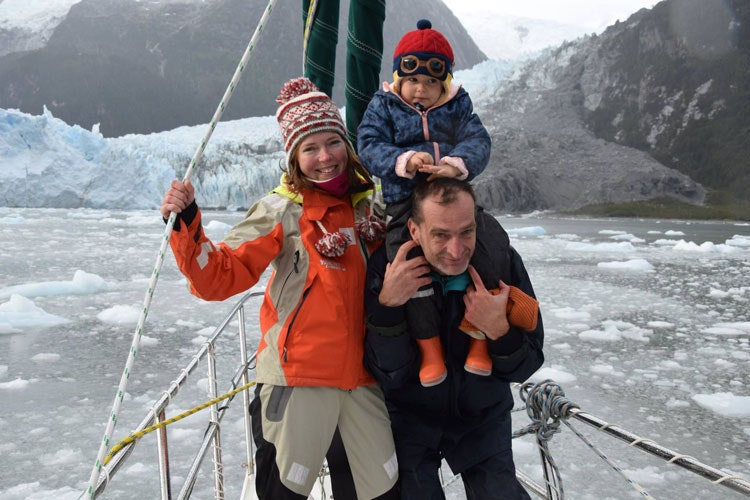 Marine sailor Jiří Denk with his family on one of the trips to Antarctica
Marine sailor Jiří Denk with his family on one of the trips to Antarctica What’s the regime like with such a small child on board?
In the morning we get up, we have breakfast and do the things around hygiene. And then a lesson, or rather more like a controlled game, we have planned play and develop some skills. In the afternoon, there is some “quiet time”, after lunch free play. And in the evening a few fairy tales and off to bed. Even on long crossings. From Georgia, we sailed for two weeks to Brazil nonstop and it was an uncomfortable cruise. But the daily routine does not differ much. Maybe only if my wife is sick :)
And what about kids when the weather’s worse, do they handle it better than adults?
I’ve been taking Hanička on every carousel I see since she was really tiny. She’s been with us since early childhood on board, in fact she was with us for the first time at 15 months when we sailed around 3,000 miles - to Tonga, Fiji, Vanuatu, New Caledonia and New Zealand. Since then, this has been her natural environment. As long as nobody tells a child that they’re going to feel sick, I think they generally don’t. I am curious myself when she realises that she might actually get sick, whether it changes something or not. So we'll see.
You spend a large part of the year on the boat.
Five months of the year. But not divided up much. Now we’ve been sailing a long time, from November to February, four months, and this summer it will be just a month around the Brazilian coast. As a family, we'll have been away for three months, five months in total. But this stage is rather extreme.
Stories of other famous sailors and yachtsmen who might interest you
What about returning back to the Czech Republic after five months at sea?
I've been traveling this way for 12 years. So when I come home, within in two days I forget I was even away. It completely absorbs you and you get back into the swing of things quickly.
When travelling becomes a normal part of life and your lifestyle, there is not so much anticipation before setting off. A little bit, but nothing too much. So if I were leaving today, I would have begun to think about what to take with me just yesterday - and I’m sure to have forgotten something. You think about everything you need to take care of in those 5 months, not lettings bills get overdue when you’re not at home and other practical day-to-day things.
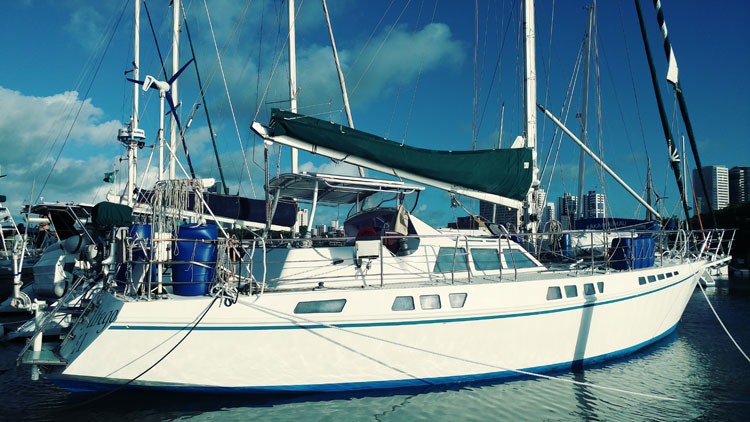 Sailboat Altego II in Brazil
Sailboat Altego II in Brazil Do you take anything special on such a long journey? In comparison to someone packing for 14 days on a yacht?
No. Now I'm going for 5 months and I only have hand luggage. And the heaviest things are pilot books and guidebooks. I take tablets for using maps, a laptop for writing articles and a mobile charger. And that's it. And now that I think about it, I actually forgot to take a toothbrush :)
We can be the first ever ship to do this
And for 14 days, you'll always pick up the crew, sail for a part of the journey and then swap?
Yes. I have divided this voyage into 14-day stages, starting and ending where it is easy to land by plane. Most places are taken, but if anyone wants, they can still log in and join us for part of the trip.
I was surprised that only one guy with his son had signed up for Suriname, Gyayana and Tobago, which I consider to be the most interesting. I don’t really understand it.
Is it a fear of the unknown?
Probably yes. Many people think Suriname is in Africa. And it’s not. But it was the same in summer when cruising around Brazil. It was a beautiful romantic cruise around the Brazilian coast. And no one had signed up. And then people told me: we're afraid it's dangerous. But it’s the same everywhere. I mean you don’t go to poor neighbourhoods when you travel just like you don’t go to poor neighbourhoods in Brno or the more infamous districts of Prague. You aren’t crazy. But people see it in a distorted way.
Surprisingly, comfort and the desire for familiarity often prevail over the desire to discover something new and unusual. This is what has personally surprised me the most.
Do you have any worries about the current route? Is there a dangerous place or area waiting for you?
No. No. There is Venezuela which is a bit problematic and we will basically avoid it. I'll be there the first night with the lights off. I’ll go out early in the morning for the whole all day, turn off the lights at night and then I am basically out of reach of any problems from the shore. The situation there is uncertain, not that it is actually that dangerous, but caution is needed.
And apart from that everything is safe, no hitches, just continuous good weather. The fact is that someone can rob us, for example, there is more crime on some of the Caribbean islands. If you leave a boat on the water with a motor, it can be stolen.
Are you aware of all the information in advance?
Much of the information only gets to us when we are actually sailing. We ask boats that are already anchored there what it is like. We share experiences and tips with each other. They sail from one direction, I from the other - I tell them where it’s good to anchor and what not to forget and they give me similar advice. The community is very friendly, exchanging experiences and information is essential. So generally I don’t prepare much in advance.
What do you enjoy most at this stage?
I’m looking forward to the fact that the family will be together in warmer waters. A specific place? I’m looking forward to Cuba. I was there 15 years ago, so I’m interested to see what it will be like now. I really enjoyed my time there.
I’m looking forward to seeing the rest of the family. To Hanička’s cousins, my brother-in-law and sister-in-law, who are sailing with us for the first time. To my mother-in-law with a friend who have already sailed with us. And to Christmas in Martinique, where everything is so relaxed. The family will be together.
A cousin will come with his wife and a lot of friends. It's close, tickets are cheap, the location is interesting. There’s a great deal of interest in the place, but there are still a few spots available.
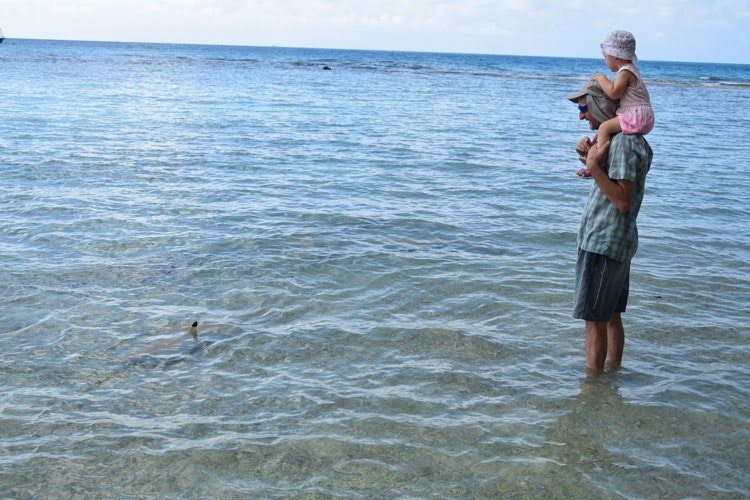 Jiří Denk with daughter and blacktip sharks in French Polynesia
Jiří Denk with daughter and blacktip sharks in French Polynesia Two years you sailed in colder waters, before in warmer, is this change on purpose?
It is funny how it turned out. I bought this new boat at the end of 2013 in New Zealand. And we left our old ship Altego I for sale in Thailand and Malaysia. It was hot. We went back to New Zealand and the weather was so freezing that we sailed to the Pacific, Tonga, Fiji, Vanuatu, New Caledonia and back again to warm up.
And then we came back to New Zealand, where swimming isn’t that great even in summer. We said, well, we have 2 seasons here, so where now? Head east to Thailand and Malaysia where we came from? Or back through the Pacific to Patagonia?
Well, I’d promised to show Antarctica to Petra and Hanička too, although she wouldn’t remember that of course. So the choice to sail to French Polynesia won over. We were there for the whole summer, and we would have stayed longer, but there was already such heat there that people were saying - let’s go to Patagonia. And when you have two seasons in Patagonia, it’s so freezing there that you long to be in the warmth again which is where will be now.
Next year, if Neptune is merciful, we will head northwest from Greenland, Canada to Alaska, where we will freeze again a little. And then we’ll warm up again in Mexico. If Neptune allows.
Do you still have a dream route?
I am a little bit divided here. That northwest route from Greenland, that's my dream journey. Not so much for my wife, but she accepts it, because no Czech or Slovak ship has ever done it. So if we're lucky, we can be the first ever boat to sail it. And with Hanička on board it would be nice ...
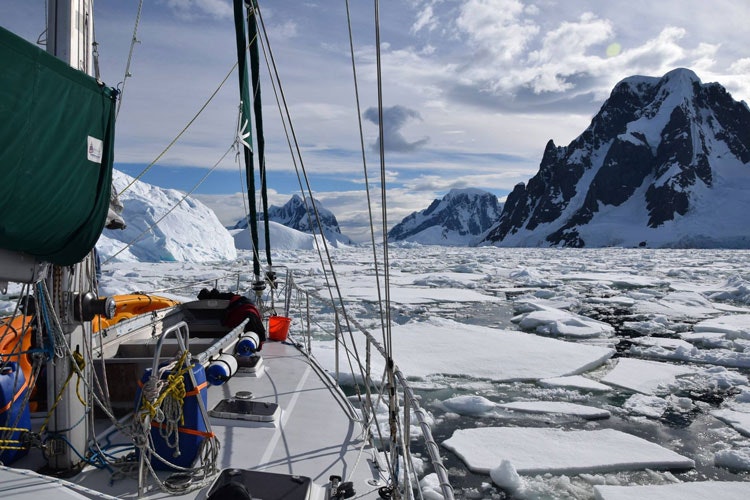 The voyage of Jiří Denk to Antarctica
The voyage of Jiří Denk to Antarctica And then there are two variants from Alaska. I was approached as to whether we would sail on the northeast, that is Russia and Siberia to Norway. But the bureaucracy is complicated. However if we get through the crazy bureaucracy, then I’d definitely sail it. It's a unique opportunity, because only about 10 ships in the world have ever done it. Current warm climate conditions look promising. The real question is whether the bureaucracy can be dealt with, it is really difficult regarding Russia.
Well, and the second option is to go to Vancouver. Swimming isn’t great there, but it's beautiful. Stunning fjords like in Patagonia, perhaps even better. Then we would travel to Mexico, where we would warm up again. And then we would see. From Mexico we would probably sail to Marquesas where I've never been before. And then finish the circumnavigation of both Americas, something no Czech or Slovak has ever done.
Hi, I’d like to rent a boat please
How did you actually get started with yachting?
It’s a funny story. I think it was 1999. I was walking around the office where they rented out boats and I just said, “Hi, I’d like to rent a boat please”. And that's how it all started. I went to Croatia for papers that week because I did not have any. And in a week or two I rented a boat. No, it was never my dream, or even my plan. But it’s true that I have tended towards grappling with the elements. I’ve been gliding, paragliding, ridden horses. So I always enjoyed contact with the elements.
And you still fly?
I don't’ fly because mostly I’m not here in the summer, and these are two things that can’t really be combined. To be honest, I really miss flying but the boat means more to me. But both are dear to my heart. It's one of the few things I’ve had to give up, and I regret it but it is what it is.
Back to your beginnings...
The first year I was in Croatia twice, the second year four times, and the next year eight times. That's how it all started. And then I rented a boat in Norway, Greece, Italy and France. And then it developed naturally. If you want to go on a boat several times, it gets difficult to put a crew together, and so it was quite logical to think about buying your own boat. So six years after first climbing on board a boat, I bought my very own ship in New Zealand and set sail.
What I have to say is this - if your readers are now thinking how much they like the idea but have to prepare a bit more for it, I would like to point out that they will never really be prepared. You just have to dive in. There are things that no one can learn in any other way other than by going out and doing them..
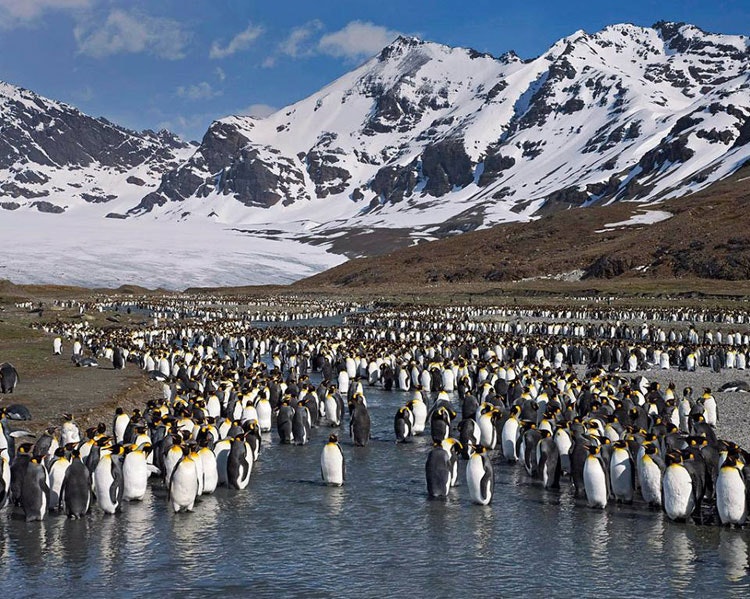 Penguins on the way to Antarctica
Penguins on the way to Antarctica What was the most difficult?
Right after I had bought the ship. I chose her on the last day in New Zealand, or she chose me. The previous owner, whom I had never seen, was a Frenchman, and everything around the boat was in French. And I didn’t understand a thing. An expedition ship on which you sail longer distances is quite different from a classic charter boat.
What is specific about?
The Altego I was aluminium, 12 metres and had an engine that was very difficult to access. When chartering, you don’t learn anything about the engine. When it breaks down, you just pick up the phone and say: I know what’s wrong, it's broken. And then someone comes, fixes it, apologizes, gives a discount, and that's it. But on your own boat there is no one to call.
When the engine breaks down or when I could not find how to switch between diesel tanks. Or there is a system of pumps, which you don’t understand, or don’t know how the intake and drainage of fresh and salt water is done. You look at it and don’t understand a thing. Because everything is so much simpler on the charters.
Navigation is an entirely different issue. Nowadays it's simple, there are smartphone apps where you simply tap your finger. But when I started in 2007, none of that existed. Of course, the electricity on each boat of this type is unique, and it's very hard to orientate without experience.
The Altego II measures 16 metres, has 2 engines and 2 keels. The first ship had a retractable keel, which is something you don’t really see anywhere else.
How do you handle repairs on the boat, did you have to learn a lot?
You have to be self-sufficient. They are easy things, but of course the more difficult things I can’t fix. When sailing the first boat, it was actually the newest component that broke. The starter I had bought in New Zealand. And it was impossible to fix as the pinion had broken.
But I must always be able to break it down and see if there's any chance of making it temporarily operational. There was no chance there. You have to learn a lot, especially about the engines.
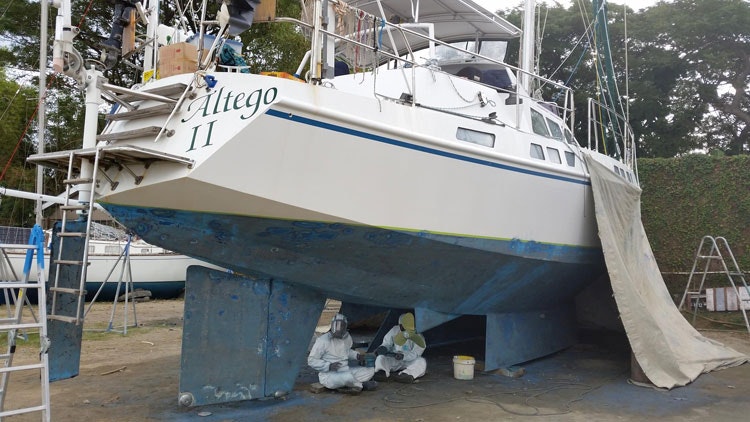 Repairs and grinding the Altego II
Repairs and grinding the Altego II You must always be on guard
What about the crews that are sailing with you? Are they also experienced and can you depend on them?
No no no. You can only rely on yourself and it’s like that your whole life. And if someone thinks it's not like that, then I think they’re living in a dream world. The captain is there to handle everything.
I've sailed many times and alone. When I sailed around the world between 2007 and 2010, I sailed about 3,000 NM. And I remember what it was like when I first sailed alone for 5 days. And then I had sailed for 9 days alone, then for 14 days, and you get used to it. When I sailed from New Zealand to French Polynesia, I was sailing for 3 weeks alone. And when I sailed from French Patagonia to Patagonia, I sailed for 34 days alone. I'm pretty proud of that.
What's the worst thing that can happen when you are by yourself on a boat?
It is very dependant on whether there is much traffic or not. That's how your regime unfolds. When there is a lot of traffic, you can only sleep for 15 minutes at a time at night, then you have to get up, take a look around and go back to sleep for 15 minutes.
Of course, if autopilot is on and doesn’t fail. And there is no wilderness. You can nap in the day. During the day you can get half an hour or three quarters of an hours sleep when there is good visibility, because the ships can be avoided. At night, the visibility from the position lights is terrible, you see almost nothing.
And when there is less traffic?
And when there is not so much traffic, for example, in the middle of the ocean, then I can sleep at night for half an hour. I sleep by the instruments, I mean, for example, and as soon as one of them beeps, it will instantly wake me up. And I always set my alarm clock to check the wind direction, to see if it has changed because the wind is ever evolving and of course it can change. When there isn’t much traffic, everything is much calmer. Otherwise, you really have to be on your guard.
When a person sails by himself, they see things differently, how does the psyche react?
I think that a person who truly wants to hear themselves must be isolated from external stimuli. And it doesn't matter whether he goes for a week to the dark or goes on a long journey alone, backpacking along mountain ridges, or sailing to Santiago de Compostela, practicing intensive yoga for 5 years and able to practice holotropic breathing. There are many journeys to your inner self.
And seafaring, sailing a week or two, without seeing a shore, is a form of meditation. You get inside yourself and inevitably must confront yourself. I would say that for at least 20% of people, when the shore disappears from sight, they are fully aware of their inner problems. They have no TV, radio, no mobile phone, they have no urges, they stop seeing a fixed point and they have the problem of being alone with themselves. Even though there is no actual storm.
Has it ever happened that someone has completely panicked or got into an uncomfortable state?
A few times it happened to me. Perhaps the worst case was when one girl fell completely to pieces.. She had been aboard with me for a few days, so it wasn't instant. But when she stopped seeing the shore, she became totally hysterical and broke down. It was harsh and demanding.
What helped, did it get better?
Well, with clenched teeth I sailed for 14 days, the shore disappeared on the fourth day, so it was only a week. It just had to be endured. There was no point in talking to her. In another case, it was just as bad. But you can often see people getting into internal problems, although mostly not so severe.
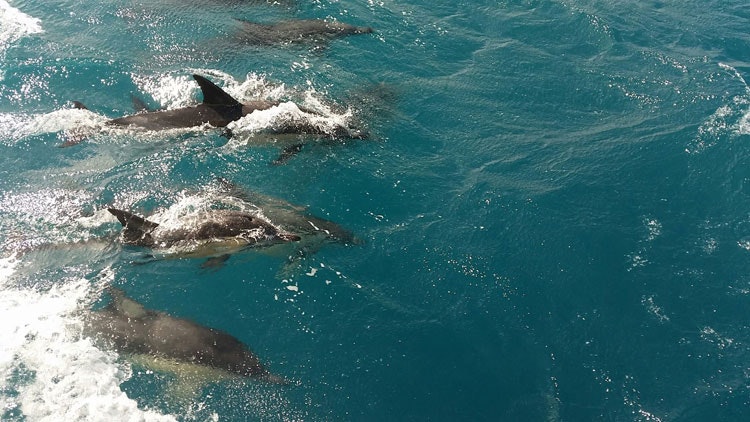 Dolphins on the voyage around the world with Altego l
Dolphins on the voyage around the world with Altego l Taking someone with you, who you’ve not been with before on the ocean for two weeks, is a risk
Are you familiar with the crew that sails with you in advance?
I'm coming from Suriname with a guy who’s bringing his 9-year-old son and we’ve never met each other. We’ve spoken on the phone several times, but I haven't seen him because of my workload. But I don’t mind that. I leave it up to fate a bit. I take it that it's no coincidence and I might even learn something. That's why I rarely get to know people in advance but it sometimes happens.
The remaining crews are friends, family, people I know a little, some of them bring friends I don’t know. It's a bit of a lottery, but it's worth it. Even if I met them, I wouldn’t know how that person will react.
I’d rather go alone than have an idiot in the crew, that's for sure. Even though I've spent my life working with people, I don’t necessarily understand these people. I take it as standard, that once in a while somebody like that will inevitably turn up on the crew. Even if you know him and you’ve been “going out for a beer or two” for 5 years, it’s not until you put him in an uncomfortable situation that you’ll find out exactly who he is.
Therefore, as a joke I tell people that if you want to get married, taking someone you have not been with for two weeks on the ocean is a risk, a gamble. I'm not thinking of sailing in the Caribbean from pub to pub, I don't mean gastro yachting. Also it’s not just about an actual sea cabin. It could be camping in a tent in the rain. Or in the mountains. When a person gets lost, gets frozen and the darkness threatens ... That type of situation.
And what annoys you the most about such people?
I do not know how to name this characteristic ... I see it, for example, at the races I’ve organized. It’s someone’s first time on a boat. The first day they’re clueless, the second day they find their feet, the third day is good, and the fourth day they are already handing out advice. Hey, listen, you should go there, you should loosen this line, and you shouldn’t curse? What is this characteristic? People without common sense? Occasionally, this type of know-it-all person, who hasn’t done anything in their life, shows up.
Massacre and winds of 200 km per hour
What is your most adventurous experience at sea?
I'm always glad when everything goes according to plan. That's the strangest thing. The fact is that some things break and will always break. It cannot be avoided.
When we sailed to South Georgia, after four days of the cruise, a storm came to the Falklands with 200 km per hour winds. Fortunately, we were hidden. It was a massacre and the fiercest wind I've ever seen.
Then, when we went to South Georgia for eight days, the heating broke down the night before completing the journey. It really hit me! It’s at the same level as Cape Horn and it's freezing. You have to go through so many different things, you have to live and survive so much and then the heater breaks down.
How did you survive?
Fortunately, the generator that does not always work, actually worked this time. And I had a convection heater, so we huddled in one cabin for an hour in the morning and evening. Overnight we were in sleeping bags and over the day it wasn’t so cold, about 12 degrees.
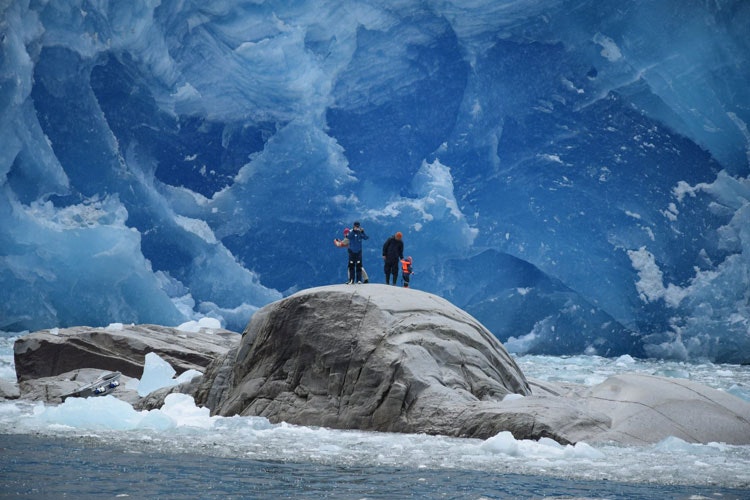 Jiří Denk on the mainland on his way to Antarctica
Jiří Denk on the mainland on his way to Antarctica And how did you handle the storm on the Falklands?
We were moored in a sheltered place behind a freighter. Out of the eight ropes we were tied to, two broke and two of them were frayed. Within a few hours. I just looked out to see if the lines were holding or not. The idea of grabbing another line and tying it was totally unthinkable. I lost the wind meter at 60 knots, it was destroyed and burned out. Reportedly, they recorded the wind at over 100 knots, which is 200 km/h.
Did you have a backup plan, what were you going to do if the other ropes didn’t last?
If two more ropes had broken and we were really hanging by just two, of course I would have had to go and tie a rope somehow. I would have certainly done that, that's for sure.
Once, I think in 2010 in Patagonia, when I first came back from Antarctica with the first boat, there was also a storm of about 130 km/h, and it forced us to anchor. And in that wind, I had to go and tie the rope somewhere. But when you have to, you have to.
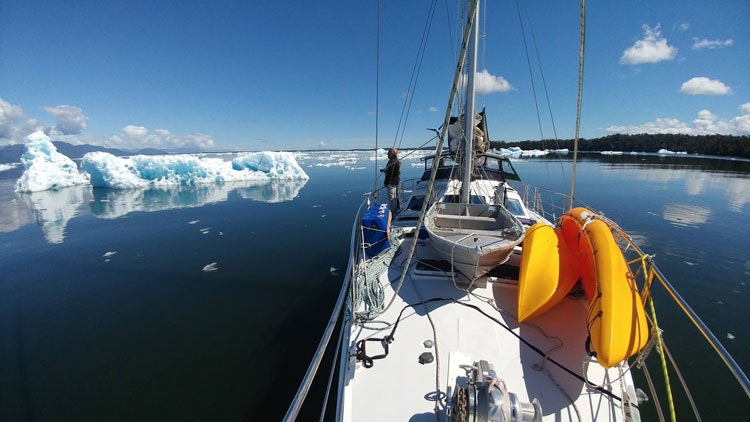 Cruise from Ushuaia to the Falklands and South Georgia
Cruise from Ushuaia to the Falklands and South Georgia And the most beautiful experience?
You must realize that on a long-haul, up to 98% of situations are beautiful, pleasant, cool - romantic. What people ask the most about and what they write about is mostly just the remaining 2%. Also, those good experiences aren’t articulated well. For example someone will say: well, it was beautiful, and the next day was beautiful, and the third day it was absolutely beautiful. It's not very interesting :)
But what were the truly unforgettable experiences? When we were with Hanička in Antarctica, she was less than three years old and walked among seals and penguins. I remember it very well. That she got to experience something that is utterly incomparable to anything.
In South Georgia it was even more powerful. In Antarctica, we saw around 5,000 penguins in one colony, but we were at the Georgian beach, which was about 5 km long, there were 400,000 penguins. Me, my wife and daughter, 400,000 penguins, and not a single person within 100 km.
Those are experiences ...
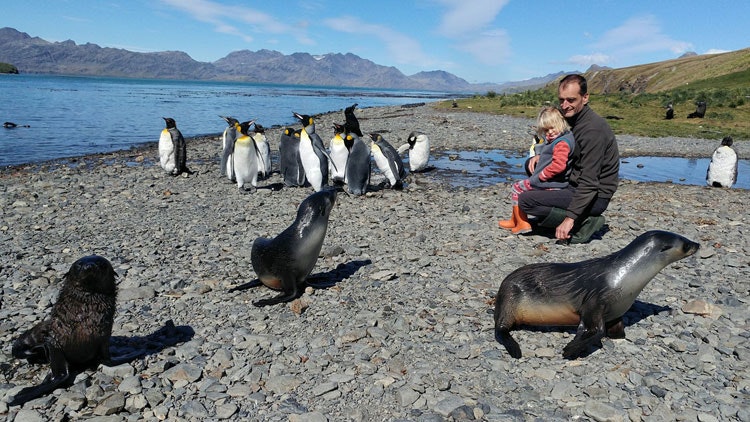 Jiří Denk with his daughter Hanička among penguins and sea lions
Jiří Denk with his daughter Hanička among penguins and sea lions And when we and Hanička were in French Polynesia in one bay. There were black-eyed sharks, which are friendly even though they are a meter and a half long. We were holding hands with Hanička, walking in the bay and about 10 sharks swimming around us. I like to remember that because you realise they were kind.
Jiří Denk’s voyages around the world
In the years from 2000 to 2006, Jiří Denk undertook 30 voyages. The most groundbreaking voyage for him came in 2005 when he crossed the Atlantic for the first time and came to the realization that he actually could sail across the oceans.
With that in mind, in 2006, he purchased his first sailboat, the 12-metre aluminium sailboat Altego I in New Zealand, on which he began a journey around the world in April 2007. Over nine stages, he gradually sailed to Fiji, Papua New Guinea, Bali, Malaysia, Thailand, the Maldives, Madagascar and South Africa. He also visited Brazil, Uruguay, Argentina, Patagonia, Antarctica, Chile, French Polynesia and the Cook Islands, and covered a total of 32,490 NM. In 2010, Altego I became the 7th Czech boat to circumnavigate the globe and he became the 12th Czech in history to do so. Plus it was the first Czech boat in history to sail Continental Antarctica...
By 2014, he had circumnavigated New Zealand, sailing to Fiji, Vanuatu, the Solomon Islands, as well as Papua New Guinea, Australia, Micronesia, Philippines, Sandakan in Borneo, and along the Kinabatangan river, the Sultanate of Brunei, Borneo, via Singapore, Malaysia and Thailand. The very last voyage on the Altego I was from Thailand via the Andaman Islands and the Similan Islands back to Thailand. It totalled another 13,870 NM.
In 2014, after the birth of his daughter, he decided to upgrade his boat to the larger Altego II and set off again around the world, which soon turned into journey to circumnavigate the two Americas. Setting sail from New Zealand, three more trips to Antarctica awaited him, the Kingdom of Tonga, Fiji, Vanuatu, New Caledonia and French Polynesia, Gambier, Chile and Ushuaia (Patagonia). This last ninth stage has led him across the Falklands, South Georgia to Brazil. What awaits Jiří Denka on the tenth?
In 2019, he set sail from Upernavik, Greenland, to attempt the dreaded Northwest Passage (Greenland-Canada-Alaska) in the Arctic Ocean around the North Pole. After thirty-six days of sailing and 3,080 Nm, he succeeded at 6.30pm on 4 September 2019. Jirka's ship thus became the first Czech ship ever to complete this voyage.
